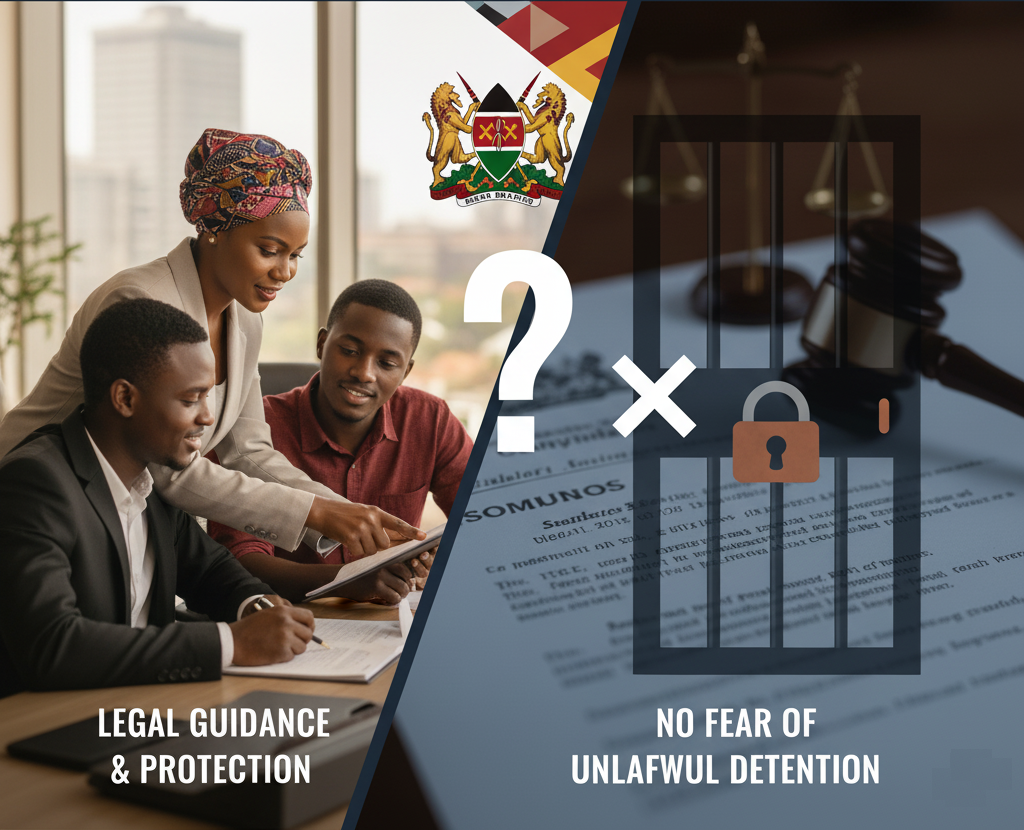Learn more about Debt Collectors & Civil Law in Kenya
Home / Blog Post
A Detailed Look Into Important Legal Topics, Written by Our Legal Experts. Get Useful Advice, Legal Explanations, and Practical Tips.

Can Debt Collectors Really Have You Locked Up in Kenya?
In Kenya, as the cost of living rises, many citizens and businesses find themselves struggling with debt. The frantic calls and intimidating messages from debt collectors often come with a terrifying implied threat: “Pay up, or you’ll go to jail.”
This threat taps into an old, historical fear—the debtors’ prison. But in modern Kenya, does this threat hold any legal weight?
This article breaks down the legal reality for both debtors and creditors, separating the myth from the law under the Constitution of Kenya, 2010, and the relevant statutes.
The Truth: NO! Not for Just Being Unable to Pay
The primary, most important legal principle is drawn from international law, which Kenya has adopted. Article 11 of the International Covenant on Civil and Political Rights (ICCPR), which is part of Kenyan law under Article 2(6) of the Constitution, strictly states that:
“No one shall be imprisoned merely on the ground of inability to fulfil a contractual obligation.”
This means that a debt collector or creditor cannot legally have you thrown in jail simply because you don’t have the money to pay a civil debt (like a bank loan, a rent balance, or an unpaid invoice). The era of the true “debtors’ prison” is over in Kenya.
The Critical Exception: Why Arrest is Still Possible
While you cannot be jailed for the inability to pay, you absolutely can be arrested and detained for an act of deliberate disobedience or contempt against a specific court order.
This is where the law becomes complex and critical to understand.
The Role of the Civil Procedure Act
The Civil Procedure Act (Cap. 21) outlines the mechanisms a court can use to enforce its judgments. Specifically, Sections 38 and 40 permit the arrest and detention of a judgment debtor as a method of enforcing a decree.
However, this power is not a license to jail the poor. It is used in very specific scenarios:
- Refusal to Appear in Court: If the court issues a summons for a judgment debtor to appear for an ‘examination in aid of execution’ (a session where you disclose your assets and ability to pay), and you deliberately ignore that summons without a valid reason, the court can issue a warrant for your arrest for failure to obey a judicial order.
- Deliberate Obstruction: If the court is satisfied that the debtor is intentionally obstructing the execution of a decree, has willfully refused to pay despite having the means, or has dishonestly transferred or concealed assets to avoid payment, the court may order a committal to civil jail.
The Key Difference: The committal is not punishment for the debt; it is punishment for Contempt of Court—the deliberate act of undermining or disrespecting the court’s authority and orders.
The Current Legal Conflict: Judges Disagree
The application of “civil jail” has been highly contentious in Kenyan courts, leading to conflicting judgments from different judges:
- View 1 (Against Civil Jail): Some judges (like Lady Justice Koome in the past) have ruled that committal to civil jail is unconstitutional as it is used to “punish, humiliate and subject the debtor to shame and indignity” purely for failure to pay a civil debt, violating fundamental rights.
- View 2 (For Civil Jail under Procedure): Other judges have held that civil jail remains constitutional, provided there is strict adherence to the procedure laid down in the Civil Procedure Act, making it a measure against willful non-compliance (contempt) rather than a measure against mere inability to pay.
The practical takeaway remains: While the legal ground for civil jail is shaky and rarely used for ordinary debt, a deliberate and flagrant disregard for a court’s procedural orders puts you at serious legal risk.
Other Real Consequences of Unpaid Debt in Kenya
Jail aside, failing to pay a court-decreed debt carries significant and real consequences:
Mechanism | Description | Impact on the Debtor |
Asset Attachment & Sale | A court order allows licensed auctioneers to seize and sell the debtor’s non-exempt property (cars, land, equipment) to settle the debt. | Loss of assets and major disruption to personal or business operations. |
Garnishee Orders | A court order is sent to your bank or a third party (like your employer) compelling them to redirect money (e.g., your salary or funds in your account) to the creditor. | Frozen bank accounts and compulsory wage garnishment. |
CRB Listing | Failure to service loans or credit facilities leads to an adverse listing with a Credit Reference Bureau (CRB). | Inability to access credit (loans, mortgages, credit cards) for years, severely limiting financial freedom. |
Bankruptcy/Insolvency | For individuals or companies with debts exceeding a legal threshold (currently KES 100,000 for individuals), a creditor can initiate bankruptcy proceedings, leading to the liquidation of assets. | Total loss of financial control and permanent record of insolvency. |
For Debtors and Creditors: Seek Legal Counsel
Debt recovery and enforcement is a nuanced legal process in Kenya.
- If you are a Debtor and have received a demand letter or court summons, do not ignore it. Engage legal counsel immediately to explore options like negotiating a payment plan, disputing the debt, or presenting evidence of your inability to pay to prevent a finding of contempt.
- If you are a Creditor seeking to recover funds, your goal is payment, not a legal battle. Our firm helps you navigate the complex laws—from drafting an effective Demand Letter to securing Garnishee Orders or filing for Insolvency—ensuring every step is compliant, ethical, and maximizes your chances of recovery.
Don’t wait for the worst-case scenario. Contact us today for expert legal guidance on debt recovery and insolvency in Kenya.

This article is intended for informational purposes only and does not constitute legal advice. Laws and procedures may change, and individual cases vary. If you are facing legal issues or have been arrested, consult a qualified advocate or legal aid organization in Mombasa for professional legal guidance.
